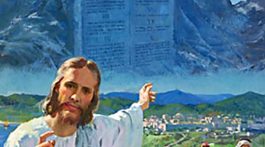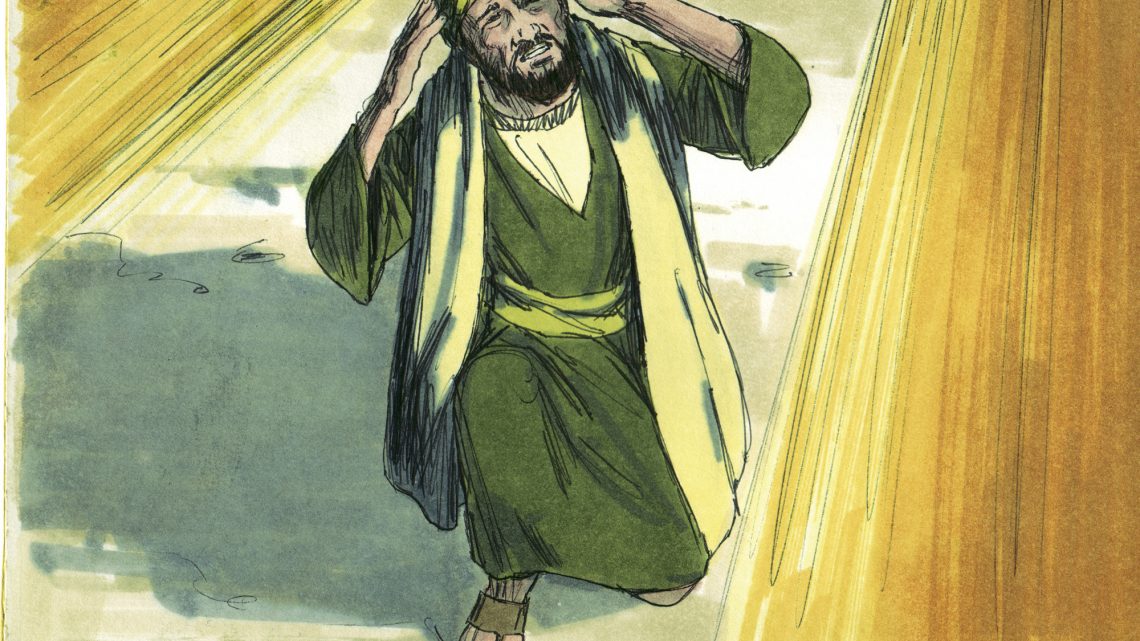Sabbath School Lesson for July 28-August 3, 2018
Outline
Saul, later known as Paul (his Greek name), is seen as…
- a persecutor (Sunday),
- a convert (Monday and Tuesday)
- the apostle (Wednesday and Thursday).
Drawing largely from Acts, chapter 9, we are shown what great achievements can be made for God, when one unreservedly chooses to follow God, despite a less-than-stellar past and/or negative upbringing.
Introduction
The church must have been tremendously saddened when they lost Stephen. His faithful service as deacon represented the true calling of all church leaders today. But as we’ve often seen, the Holy Spirit had another leader in mind to replace him, who surpassed all their expectations of what it means to be an evangelist.
Stephen’s martyrdom proved to be a bridge to another church worker, whose conversion experience was as unique as the man receiving it. Saul (his name in Aramaic, or Hebrew) became known as Paul (the Greek version of his name). With such an abrupt turnaround of his life, it seems appropriate that even his name received a change.
We are fascinated with Paul’s story which brought him from being a Jewish persecutor of Jesus-followers to becoming an evangelist who reached thousands Gentiles with the gospel of Christ. And his letters to the churches he served have continued to enrich God’s people ever since.
Memory Text: ” ‘Go! This man is my chosen instrument to proclaim my name to the Gentiles and their kings and to the people of Israel.’ “ Acts 9:15 NIV
When we enlist in God’s army, we too become His vessels or instruments of service. He has a designated purpose for each of us, working within the confines of a church community that far exceeds what we can accomplish on our own.
Paul answered his call to church duty, even though the task was totally opposite from what he had previously felt called to do. But God knew the heart of Saul the persecutor and understood what he could accomplish when his energies were given a new direction.
We mustn’t always expect such a dramatic calling as Saul had though on the road to Damascus. God uses various methods of grabbing our attention–some subtle and serene, some very public and “in your face”. But whatever method God uses, we must have our hearts ready to hear the call and act on whatever is needed by God’s church at the time.
It’s easy to complain and criticize what’s wrong with our church today. But how much more productive would it be for us to plead with God for guidance and then follow Him in reversing those wrongs.
Sunday: Persecutor of the Church
Saul was born a Jew, from the tribe of Benjamin, in Tarsus, the capital of Cilicia, a province quite north of Judea. Evidently, his family’s wealth allowed him to be educated in Jerusalem, however, under the tutelage of a well-known rabbi, Gamaliel. See Acts 22:3, Philippians 3:5.
His religious instruction in Jerusalem led to him being a Pharisee (stout protector of Jewish traditions), a member of the Sanhedrin council (which oversaw the operation of the temple), and a Zealot for Judaism (a fanatical sect of Jewish activists). See Acts 23:6, and 26:4, 5, 10.
Saul used all his political power to destroy the body of Jesus-followers that was growing so rapidly. He performed the duty of a shaliah. To be a shaliah meant you were sent out to perform religious functions beyond the temple in Jerusalem.
Saul found himself a shaliah, or official agent for the Sanhedrin, and sought to receive permission to persecute those troublesome Messianic misfits, who later became known as Christians. Saul would have been happy to see them wiped out entirely from the Jewish landscape.
Discussion Questions:
Read Acts 8:1-3 and 26:9-11. What motivated Saul to go to such lengths to destroy those who followed Christ?
Read Acts 26:4, 5 and Philippians 3:5-8. Even though Paul considered his former life before conversion as rubbish, how did his upbringing help him in his ministry to the Gentiles? What advantage or disadvantage do we receive when we are born into a Seventh-day Adventist family?
Read Acts 9:1, 2. 22:4, 5, and 1 Timothy 1:13. What was Saul guilty of, besides persecuting Christians? Why are methods important? What do they tell us about the person using the method?
Monday: On the Damascus Road
Witnessing the stoning of Stephen must have touched Saul’s heart to some extent. The Holy Spirit continued to “goad” him, until the time was right for an intervention. It happened on the way to Damascus, a city about 135 miles north of Jerusalem, where Saul was going to inflict more punishment on the Jewish believers.
Suddenly at noon, a time when the sun shines its brightest, an intense light began to shine upon Saul and his fellow travelers. Everyone saw this powerful light, but only Saul was actually blinded by it. Likewise, everyone heard a voice, but only Saul was able to understand what the voice said.
The message of the voice opened Saul’s eyes and heart. Not only had he been persecuting his brothers and sisters, he was actually persecuting the Messiah Himself. Until that moment, Saul hadn’t identified Jesus as the Messiah.
Saul must have felt extreme guilt and remorse at this surprising revelation, but that didn’t stop him from asking the questions that we all must ask…
“Who are you, Lord?” and “Lord, what do You want me to do?” (Acts 9:4, 5 NKJV)
Discussion Questions:
Read Acts 9:3-9, 22:14, 15. What was the purpose of this “intervention” that Jesus arranged for Saul?
Read Acts 9:5 and Proverbs 15:10. What did the Greek proverb mean about “kicking against the goads, or pricks”? How did this reference to Jewish agriculture fit the case of Saul? [oxen were guided by sticks, or pricks–the more an ox resisted the guidance of the stick, the more he suffered]
Read Acts 9:6. Why is it important for us to ask this question when we want to be guided by God? Why are we often tempted to ask God what is best for us personally, when we really should want to know what is best for God’s cause?
Tuesday: Ananias’s Visit
The miraculous way Saul had his sight restored after his blinding experience on the road to Damascus confirmed Saul’s new assignment as an apostle for Jesus. Ananias also received a vision from God, directing him to the house where Saul was staying and instructing him to lay hands on him for the healing of his eyes.
It’s understandable why Ananias hesitated and questioned God about this request. He had heard some negative things about Saul of Tarsus, who was known to be a real threat to the Christian community. It took courage to follow God. But the words were specific and could not be ignored by this humble servant of God.
After his encounter with Ananias, Saul’s sight was restored, and he was baptized. He was then refreshed and strengthened with food, ending his period of fasting, and went to be with other disciples at Damascus.
Discussion Questions:
Read Acts 9:10, 5 and Proverbs 14:12. What does the initial response of Ananias and Saul tell us about their connection with God? How does it feel to think we are right about something, but discover we are actually wrong?
Read Acts 9:11-19. How significant was it that Ananias called this proven enemy of the early church “Brother Saul” at their first meeting? Why did he use the term “brother”?
Read Galatians 1:1, 11, 12. Why did Paul, as he was later called, claim to be an apostle of Christ (a true witness of the resurrected Lord)? What revelation was he referring to in verse 12?
Wednesday: The Beginning of Paul’s Ministry
Saul’s ministry as an apostle of Christ had a rocky start. We are told that he prepared for his new assignment by spending some time in solitude and prayer in Arabia. After this time of spiritual refreshment, he returned to Damascus and began to speak in the Damascus synagogues. See Galatians 1:16-18.
Some of the Jews in Damascus were violently opposed to Saul’s new assertions that Jesus was the Messiah, however. After a time, he had to flee the city secretly at night, being lowered down the city wall in a basket. See Acts 9:20-25.
Saul, by then Paul, had many similar challenges wherever he went with the gospel. Jesus revealed to him during his vision on the road to Damascus that he would suffer many things for His sake (Acts 9:16).
Paul later wrote to the Corinthians…
“We are hard-pressed on every side, yet not crushed; we are perplexed, but not in despair; persecuted, but not forsaken; struck down, but not destroyed–“ 2 Corinthians 4:8, 9 NKJV
Discussion Questions:
Read Acts 9:20-22 and Galatians 1:23. Why was it so important for Paul to preach about Christ? In what way do we all work against Christ, when we aren’t working for Him?
Read Acts 9:22-25, 18:28, and Joshua 2:15. What specifically was it about Christ that so angered some of the Jews?
Read Acts 9:16 and 2 Corinthians 4:8, 9. How does Christ uphold us when we are persecuted for Him or having other harsh trials in our life?
Thursday: Return to Jerusalem
Eventually word spread to Jerusalem about Saul/Paul’s work in Damascus. His phenomenal turnover from tearing down the Christian church to being a stalwart supporter of its members must have astounded all the Jews in Jerusalem, both those who followed Jesus and those who did not.
After three years in Damascus (Galatians 1:18), Paul felt it was time to show himself in Jerusalem, even though he must have known the danger his presence there might create. If he had opponents in Damascus, there would no doubt be those who wished him harm in Jerusalem as well.
Many in Jerusalem, including the apostles, had difficulties grasping these two concepts:
- that the Old Testament ceremonial system had lost its validity
- that the Christian faith must spread beyond Jerusalem to encompass Jews and Gentiles alike
Paul did enjoy a small group of Hellenistic supporters in Jerusalem that included: Barnabas (Acts 9:27), Philip, one of the seven deacons, (Acts 21:8), and Mnason (Acts 21:16). This was not enough, however, to offset the violent opposition that threatened Paul’s safety, and he was told in a vision to leave Jerusalem after just fifteen days. The same Jews who had encouraged Stephen’s stoning years before were still unmoved in their positions and quite capable of carrying out a similar ending for Paul.
Discussion Questions:
Read Acts 9:26, 27. Why do you think Barnabas believed Paul, while many of the apostles did not at first?
Read Acts 4:36, 37 and 13:2, 3. What might have made Paul and Barnabas a good missionary team?
Read Acts 22:17-21. Why do you suppose the Lord sent Paul to Tarsus, the city of his birth?
Conclusion
Perhaps the most important question each of us must ask in this life is the same as Saul asked of God when he realized who God was…”Lord, what do You want me to do?”
This question alone expresses the humility and consecrated attitude necessary if we are to understand any of God’s directions. So often, we desire to know what God wants us to do, with the expectation that the outcome would be what is best for our life here on earth.
But, if we are truly wanting to follow God’s will, we must allow Him to do what is best for His cause, which is, of course, to have as many of His people saved in the Kingdom as possible. Even though it may mean great hardship, just like it did for Paul, we must be willing to trust God and endure the temporary suffering that may result from being faithful to God.
To be true to God must come with the dedication that results in sacrificially giving our own lives, in order to save others. This is what it is like to be like God. His death on the cross motivates us to this kind of dedication and love for others. It led to the enormous life of service of Paul and all those who choose to follow God wherever He leads.
Next Week’s Lesson: The Ministry of Peter
To read the Sabbath School Lesson Quarterly or see more resources for its study, go to https://www.absg.adventist.org/
All Outlook blogposts by Teresa Thompson, are at http://outlookmag.org/author/teresathompson/









